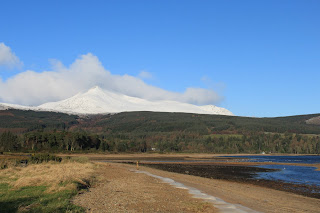

The Broad Road that Stretches

Our route, loosely planned around visits to family members, took us to the Lakes, Yorkshire, the south of England, France, Germany and Switzerland, returning to Britain by overnight ferry from Zeebrugge to Hull. A good thing about living on an island (Arran or Britain) is that journeys begin and end with a boat which is the best way to really feel the excitement of landing on distant shores or returning to your own.
Camper van travel is about the journey and not the destination. This means the pleasures of the back roads, not worrying about the time, and noticing the places you pass through. If you use your camper van as a base taking pushbikes with you for small local journeys is an excellent idea.
I love camping in a tent and always have, but practically it’s problematic when days are short. Camper van travel has the pleasures of snail-like self-sufficiency: your bed, kitchen and toilet are with you at all times. Getting to grips with electric hook-ups and chemical disposal points is straightforward. Living space is better than you expect: in our van there is room for four to sit comfortably when the driving seats have been swivelled round to face the benches in the back, which also become a double bed. The only problem we found was lack of space to store gear (if you want to do activities whilst on holiday which involve a lot of gear, like canoeing) but it gives you a challenge to take less.
The van was a cosy and flexible home, even in midwinter, though we were pleased to find some campsites still open. Naturally, as campsite wardens, we believe in supporting local economies, and in any case campsites offer electric hook ups, waste disposal and level ground. There are joys to wild camping in lonely places but getting any sleep isn’t one of them in my experience- my senses won’t go off full alert. (I should never have given my drama classes the exercise: you’re parked down a dark, deserted road, suddenly there is knocking on the window. What happens next?!)
We’ve now returned to the windy western edge of Europe. Travel makes you enjoy new places and appreciate the advantages of home. We’ve paid a fortune in parking fees but on Arran there are none. We’ve tried to visit historic sites that were chained and padlocked for the winter (the battlefield of 1066 is actually surrounded by metal spikes! We sneaked a look but worried we might get strung up from the nearest gibbet if caught) but Arran’s wealth of prehistoric sites, such as the stone circles of Machrie Moor, can be freely visited the year round. It is rare to find PRIVATE signs or CCTV here to prevent access to water with canoes, unlike parts of the Lakes.
Finally, how does camper-vanning work out cost-wise, I hear you ask. Well, our tour cost less than a week in Mallorca at this time last year. It’s the kind of travel where it’s up to you to decide how much to spend as you go along.
We won’t be selling the van.
A month of mountains and mists:

Mountains in the Vosges at the bottom
We stayed at the following comfortable campsites that open in winter:
www.kloofs.com (Sussex)
www.thequietsite.co.uk (Cumbria)
www.sandholmelodgeholidaypark.co.uk (East Yorkshire)
www.bluerosepark.com (East Yorkshire)
www.obernai.fr (Le Vallon De l’Ehn Camping Municipal, Alsace, France)



